Strengthening Community Justice Systems in Melanesia

Key Contact
Deborah Hannah Isser
Start Date
End Date
Funding Amount
$ 48,645
Knowledge-providing Countries
Knowledge-receiving Countries
Summary
Effective and transparent dispute resolution systems are prerequisites to the inclusive development of the South Pacific countries of Vanuatu and Solomon Islands. Besides formal courts, these countries support community justice systems, which blend state and non-state processes and integrate customary law and lay persons as decision-makers. However, country officials required assistance on how to best coordinate, monitor, and evaluate these systems, as well as encourage and track women’s participation. On the request from the Government of Solomon Islands, the World Bank helped organize a workshop on community justice systems, including participants from ten countries in mainly Asia and Africa. Held in Honiara, the capital of Solomon Islands, the workshop aimed to increase participants’ capacity to provide community justice systems that are fair, accessible, relevant to local needs, and equitable to women. The South-South Facility financed the costs of female participants from Vanuatu.
More than 90 public officials, judicial staff, academics, and community representatives assembled in Honiara for three days in late October 2011. Most came from Solomon Islands and Vanuatu, but participants also came from Fiji, Papua New Guinea, the Philippines, Nigeria, Sierra Leone, South Africa, and Australia. At the workshop they explored the roles and functions of community justice systems, alternative models, and approaches for overseeing community systems and collecting judicial data. They discussed common types of cases, and explored the issues around integrating women into court systems, including barriers to access.
Participants increased their know-how and skills to strengthen community justice systems, especially advancing gender equity. Over 80 percent of respondents in a post-workshop evaluation indicated that they increased their understanding of approaches to community justice. Participants from Vanuatu and Solomon Islands learned much about gender issues from the Philippines and Papua New Guinea. As one noted, “Papua New Guinea [presented] a model that will challenge Solomon Islands in terms of encouraging more women to take leading roles in our local courts." Since the workshop, Solomon Islands has taken steps under the Bank’s Justice for the Poor (J4P) program to explore ways to expand access to community courts, and Vanuatu has continued joint research in this area with the Bank.
The Bank and AusAID’s engagement in this workshop and other programs likely increased community representatives’ confidence in requesting support from government channels. This suggests South-South learning along with technical assistance from donors can draw attention to critical issues and strengthen the leverage of less engaged groups.
Beneficiaries / Participants
Fair and transparent dispute resolution systems are important to the governance and economic growth of Vanuatu and Solomon Islands. In addition to supporting formal courts, these countries support hybrid community justice systems – sometimes called traditional courts – in local communities. These courts blend state and non-state processes, integrate customary law, and embrace lay people as decision-makers. However, the community justice systems have been impaired by poor coordination, limited budgets, weak awareness of alternative models, and insufficient monitoring and evaluation. Women’s participation – both as informal decision-makers and claimants – has also been low.
In Solomon Islands in 2009, the World Bank, under its Justice for the Poor program (J4P), launched Justice Delivered Locally (JDL), an initiative to inform efforts improve justice services in rural communities. One of the first moves was to disseminate a study comparing lower tier court systems in Melanesian countries. As the J4P program helped to gradually increase awareness of local-level justice issues, those engaged in community courts requested more information on options, which prompted the Government to ask for Bank support. In response, the Bank organized a three-day workshop in Honiara, Solomon Islands that included more than 90 public officials, judicial staff, academics, and community representatives, mostly from Vanuatu and the Solomon Islands but also from Fiji, Papua New Guinea, the Philippines, Nigeria, Sierra Leone, and South Africa. Some attendees came from the World Bank and AusAID. The workshop, funded by AusAID, the Regional Assistance Mission to the Solomon Islands, and the South-South Facility, aimed to enhance participants’ awareness of community justice models and capacity to provide justice systems that are fair, accessible, relevant to local needs, and equitable to women. Officials from the Vanuatu and Solomon Islands were especially interested in learning from the Philippines and Papua New Guinea, which were supporting gender initiatives within their Barangay Justice System and Village Courts, respectively.
Moving forward
Under the J4P program, officials from Vanuatu and Solomon Islands have continued to work with the donors and local stakeholders to improve community justice systems. Authorities from Solomon Islands have expanded access to community courts by establishing “community officers” and integrating women in such positions, among other methods. In addition, the Bank recently published Justice Delivered Locally, a study of dispute resolution systems in the Solomon Islands, which includes recommendations on policy initiatives at the local level. The J4P program continues to support research on community-based court systems in Vanuatu.
This workshop and the J4P program also helped to increase the confidence of local stakeholders to pressure governments to strengthen community justice systems. The Bank and donors’ engagement in this area has likely provided local communities with leverage to make their voices heard through formal channels.

 China
China Colombia
Colombia Denmark
Denmark India
India Indonesia
Indonesia Mexico
Mexico Russian Federation
Russian Federation Spain
Spain United Kingdom
United Kingdom